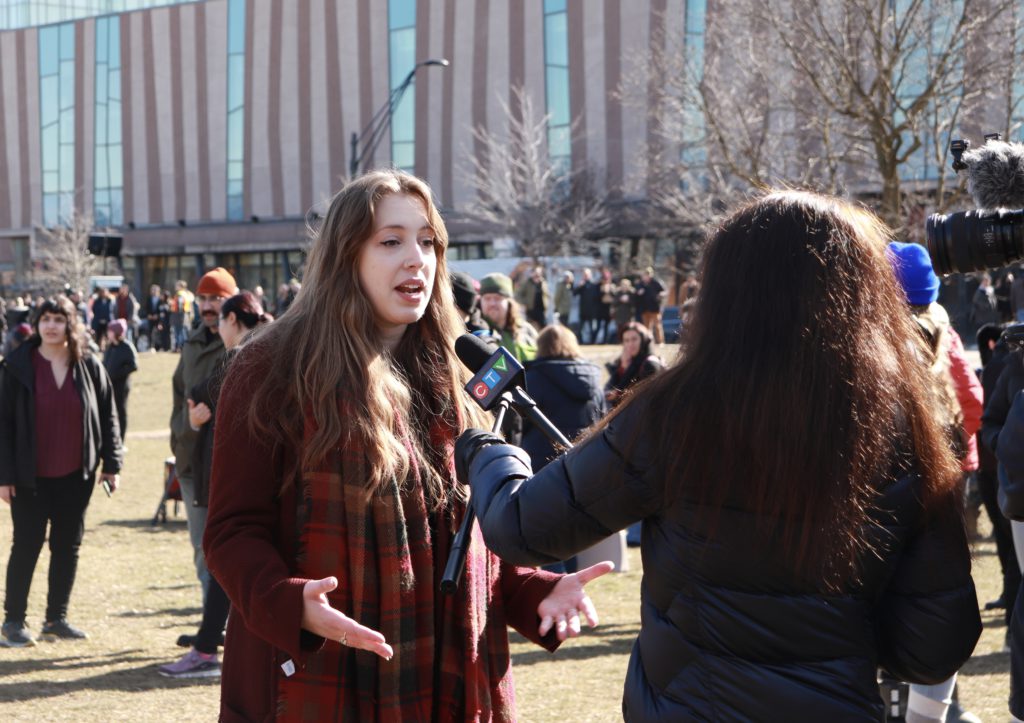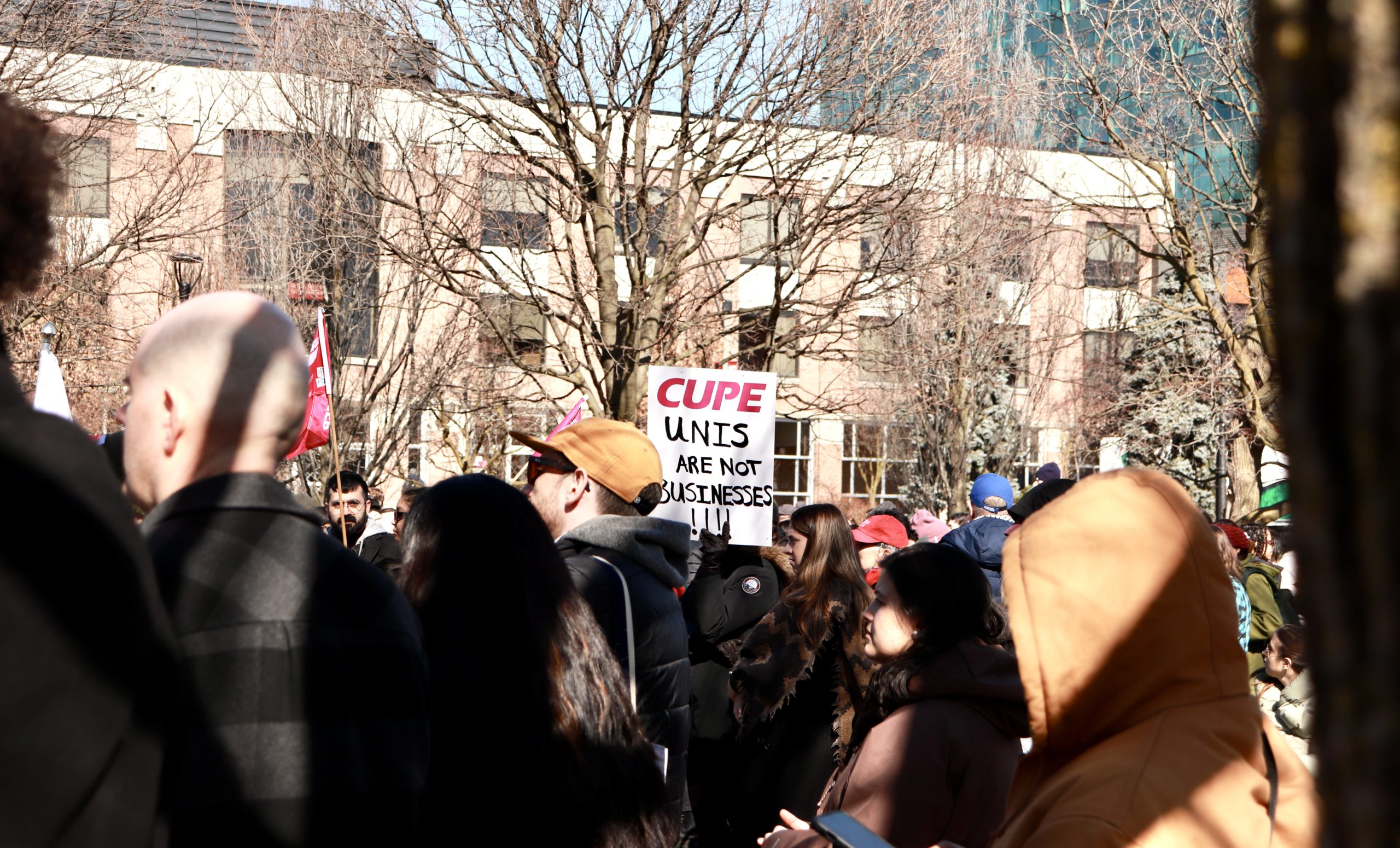On a sunny Monday morning, TAs and contract faculty at York form picket lines outside the York University subway station. To the beat of the drums, they demand a pay raise and a job security package, smaller classes, and more time for grading assignments. York faculty, students, associations, and labour unions from across the province, wave their flags in solidarity outside of the Kaneff Tower where York’s administration sits.
This is Day 1 of the CUPE 3903 strike.
CUPE 3903, the union representing roughly 3000 contract faculty, teaching assistants and graduate assistants at York, voted on Friday, Feb. 22 to go on strike the following Monday. After a weekend of bargaining between the union and York administration proved fruitless, the strike commenced on Monday, Feb. 26.
Why strike?
The strike, representatives of CUPE 3903 say, is the response to the university’s continuous failure to address the cost-of-living crisis.
According to CUPE 3903 spokesperson and bargaining team member, Shyam Patel, the strike is not simply a tactic to increase wages. It’s about survival: “Many graduate students and contract faculty, who make up 50 per cent of the teaching community, are struggling to pay for rent, can barely afford groceries, and are living paycheck to paycheck.”
This wage crisis is the result of Bill 124 which limited CUPE 3903 members to a one per cent per year wage increase. The bill was ruled “unconstitutional” by the Appeal Court of Ontario, with the government promising to dismantle the law in the coming weeks.
The teaching staff’s frustrations are accentuated by the noticeable increase in the salaries of York’s senior administration. According to the Auditor General’s report, from 2018 to 2023, York has increased the size of their senior administration team by 37 per cent.
“Where does York get the money to fund all these new admin positions?” demands Alex Wilson, one of the bargaining team members for CUPE 3903. “From international students and us, domestic people […] and laying off its workers.
“York claims to be poor, too poor to meet our wage and benefit demands, which make up less than two per cent of its operating budget. But it is clear that they have money for our contract. It’s just that they want to spend it on themselves and not on us,” Wilson adds.
It’s about more than wages
Supporters who gathered at the rally accused the York administration of fund mismanagement.
Christ Bailey, the lead steward of CUPE 3903 Unit 2 says: “We’ve been told by the administration that they don’t have any money. They don’t have money to clean the coffee stain that we’ve been walking by in Vari Hall on the carpets for the last two years.
“Why don’t they have any money? Because they have a 1.04 billion-dollar repair backlog.”
The Auditor General Report shows that York has committed approximately $745 million towards constructing new capital buildings, such as the Markham campus. Meanwhile, only $95 million was spent on deferred maintenance, leaving “many buildings and systems in poor condition.”

The Union’s other demands include smaller class sizes and a new job security program for contract faculty.
Justin, a TA and graduate student at York, explains that “working conditions directly affect student learning conditions.” He observes that contract faculty at York have been put under pressure for years.
“When I was a student, I thought that the teaching quality was a lot different between full-time professors and contract faculty”, he says. “Sometimes you have contract faculty finding out they’re teaching a course two weeks before it starts and they don’t have time to sit and develop this course.”
As the crowd gathers to hear the speeches, CUPE Ontario President, Fred Haughton, emphasises that the union’s demands concern the students as well as instructors.
“It is important to remember that many members of Local 3903 are students, too!” he says. “Our members are not only fighting to make sure they can pay the rent and buy food. They’re fighting to make sure the quality of education for students at York stays high!
“York works — despite their greed, mismanagement, and bad governance — because we work,” adds Haughton. “So, it is time to cut the bullshit and get the contract that we deserve.”
Should students cross the picket lines?
While CUPE 3903 campaigns for students rights, instructors recognize that the strike will pose significant challenges to the students. Many classes taught by union members have been suspended; while others have been moved online. TAs have ceased email communication with their students, and some tenured professors have also chosen to interrupt their academic activities in solidarity with their CUPE 3903 colleagues.
Sam Bernstein, a contract professor in the Department of English and Creative Writing comments on the lasting impact this strike could have.
“There’s no doubt that it’s going to be hard on students,” Bernstein says, “and it’s going to mess with their ability to learn what they were going to learn and enjoy the university experience that they were supposed to have. It might mess with their graduation.”
For Bernstein, the best way for students to express their frustration is to confront the administration. “They can come to the picket line if they have time, but emailing the administration is a great way that they can show their support for their faculty, who do have a right to a wage that allows them to live decently,” she adds.
Jean-Pierre Marchant, a sessional instructor in FIlm and Media Studies expresses sympathy to the affected students, explaining that the administration did not leave the union another choice.
“Strikes are effective because they are disruptive and it’s one of the few tools that we have, especially as sessional instructors and as TAs,” he says. “If it wasn’t for all these strikes, then our pay would be much less. We wouldn’t be able to live in the city, let alone teach.”
Despite the strike, many wish to continue with their work to stay on track. “It’s great if you want to support us”, says Justin. “I always hope that [students] will get as good of an experience even if they choose to strike but I completely understand if they have to focus on their education”.
In an environment where coming to class might become a political action, many students feel conflicted about whether to continue their academic activities.
Haughton encourages students to support the faculty at the picket lines: “I pledge to you the support of our union. I bring to you the gratitude of our members from all parts of our province, and I say to you, stand strong, fight back!”
Is the university bargaining in good faith?
CUPE 3903 has made clear they are prepared to negotiate solutions. However, some members are concerned that York is not bargaining in good faith.
Announcing the strike, York claimed the university’s proposals went “unanswered by CUPE 3903”. Bailey says this statement is “blatantly false.”
“On Friday our bargaining team waited for six hours without anything from York”, he says. “Bargaining was suspended after that, and we haven’t heard back from them except for their media announcements.”
Marchant also feels that the university has painted a misleading picture of the negotiations. “If [students] are just listening to the university’s side of things, it sounds like we’re the villains in this, and we’re greedy, and we’re not”, he says.
Patel states that the union is “willing to meet any time that the employer is ready to give us an offer that captures a decent collective agreement for [its] workers. We’re ready to meet today, tomorrow, on the weekend,” he says. “If we must stay until 2 a.m., so be it.”
CUPE 3903 unites workers across the province in a fight for worker’s rights.
CUPE 3903 is not alone in their struggle for better working conditions. On Monday, Feb. 26, the union received vocal support from associations in York and unions from across the province.
Andrea Babbington from the Toronto and York Region Labour Council urges CUPE 3903 to stand strong.
“You can’t go into the supermarket and find an aisle that says ‘all the groceries for free’, can you?”, she asks in her address.
“No!” the crowd chants in unison.
“So why should you back down? We’re here strong with over 220,000 of our members sending this message loud and clear to York that we are with you,” Babbington adds.
Some organisations that marched out in support of CUPE 3903 were the York University Faculty Association; the York Federation of Students; the York University Graduate Students Association; CUPE 3902, representing University of Toronto and ATU Local 113; and the union of public transit workers.
Secretary-Treasurer of the Canadian Labour Congress Lily Chang assures CUPE 3903 members that the support for their cause is widespread. “I’m here to tell you that the three million members of the Canadian Labor Congress, coast to coast, stand behind you, stand beside you in your fight,” says Chang.
Tynan Libert, of CUPE Local 2, electrical workers at the TTC, says, “Unity of workers at a place like York where people come from everywhere naturally poses the question of the unity of the working class on a world scale.”
Many at the rally see CUPE 3903 as “the vanguard” for their own bargaining in the upcoming months. Unions who march in solidarity with CUPE 3903 are lending their strength to keep going until an agreement with the employer is reached.


